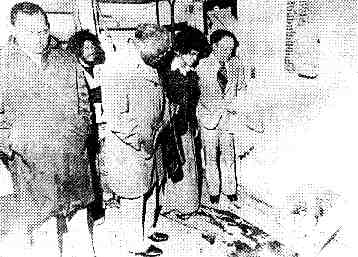
25 YEARS
ON THE MOVE
Janet and Phil Africa
JOHN AFRICA's Organization
The MOVE Organization surfaced in Philadelphia during the early 1970's.
Characterized by dreadlock hair, the adopted surname "Africa",
a principled unity, and an uncompromising commitment to their belief, members practiced the teachings of MOVE founder JOHN AFRICA.
"MOVE'S WORK IS TO STOP
INDUSTRY FROM POISONING THE AIR, THE
WATER, THE SOIL, AND
TO PUT AN END TO THE ENSLAVEMENT OF
LIFE - PEOPLE, ANIMALS,
ANY FORM OF LIFE. THE PURPOSE OF
JOHN AFRICA'S
REVOLUTION IS TO SHOW PEOPLE HOW CORRUPT,
ROTTEN, CRIMINALLY ENSLAVING
THIS SYSTEM IS, SHOW PEOPLE
THROUGH JOHN AFRICA'S
TEACHING, THE TRUTH, THAT THIS SYSTEM
IS THE CAUSE OF ALL THEIR
PROBLEMS (ALCOHOLISM, DRUG ADDICTION, UNEMPLOYMENT, WIFE ABUSE, CHILD PORNOGRAPHY,
EVERY PROBLEM
IN THE WORLD) AND TO
SET THE EXAMPLE OF REVOLUTION FOR PEOPLE
TO FOLLOW WHEN THEY REALIZE
HOW THEY'VE BEEN OPPRESSED,
REPRESSED, DUPED, TRICKED
BY THIS SYSTEM, THIS GOVERNMENT AND
SEE THE NEED TO RID THEMSELVES
OF THIS CANCEROUS SYSTEM
AS MOVE DOES."
MOVE
"...all experience hath shown, that mankind are more disposed to suffer, while evils are sufferable, than to right themselves by abolishing the forms to which they are accustomed. But, when a long train of abuses and usurpations, pursuing invariably the same object, evinces a design to reduce them under absolute despotism, it is their right, it is their duty, to throw off such government and to provide new guards for their future security."
United States Declaration
of Independence
MOVE headquarters at 309 North 33rd Street
Delbert Africa at Philadelphia School Board Meeting
March 25, 1974
Community Involvement




